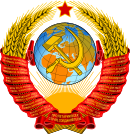Culture of the Soviet Union
Film, as a means of influencing a largely illiterate society, received encouragement from the state; much of cinematographer Sergei Eisenstein's best work dates from this period.
The quality of higher education was affected by admissions policy that preferred entrants from the proletarian class over those from bourgeois backgrounds, regardless of the applicants' qualifications.
The state legalized abortion, and it made divorce progressively easier to obtain,[1] whilst public cafeterias proliferated at the expense of private family kitchens.
Arts during the rule of Joseph Stalin were characterized by the rise and domination of the government-imposed style of socialist realism, with all other trends being severely repressed, with rare exceptions.
During the time when the Party was trying to make Soviet government more palatable to Ukrainians, a great deal of national self-determination and cultural development was tolerated.
Aleksandr Solzhenitsyn, who wrote the critical One Day in the Life of Ivan Denisovich, was awarded the Nobel Prize in Literature and subsequently exiled from the Soviet Union.
The government loosened the strictures of socialist realism; thus, for instance, many protagonists of the novels of author Yury Trifonov concerned themselves with problems of daily life rather than with building socialism.
